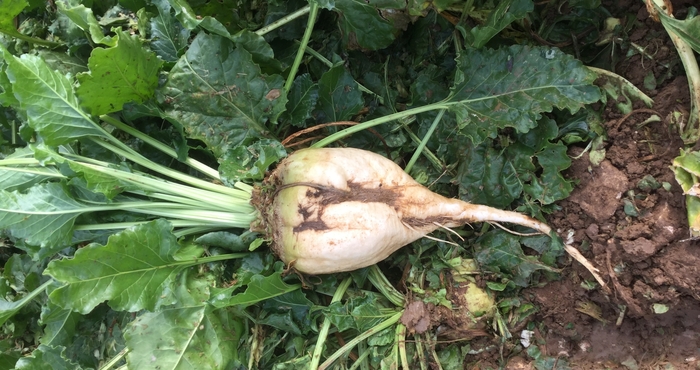The hot, dry summer in 2018 suppressed yields in fodder beet crops compared with 2017, but the results of trials, carried out by Limagrain UK, showed up the variation in performance between varieties.
“We saw a reduction in average fresh yield of 13.4% – or 11.1 tonnes per hectare – from 82.8 tonnes per hectare in 2017 to 71.7 tonnes per hectare in 2018,” says Limagrain forage crops director Martin Titley.
“Average dry matter content also fell by 0.7% from 2017 levels to an average for the trial of 20.6%. This fall in yields was seen across all forage crops in the drier parts of the UK in 2018.”
But the trials, that have been carried out by Limagrain for the past 10 years and compare up to 25 varieties most typically used in the UK, showed up the advantages of newer varieties with improved genetics. “A number of these recently introduced varieties performed well above the control and set new benchmarks for the crop,” he adds.
“For example, the white-skinned variety Brick, that was introduced in 2017, had a very high dry matter yield 17% above the control variety Magnum, and an average dry matter yield of 21.4 tonnes per hectare, putting it among the best fodder beets available.”
Brick is deep-rooted with 75% of the root below ground, making it an ideal variety for anaerobic digestion or for lifting and using in livestock rations.
“Best-selling variety Robbos also held its own in the drier conditions in 2018,” says Mr Titley. “This is a medium rooted variety that can be grazed in situ and it has a dry matter yield of 18.1 tonnes per hectare.
“We have carried out 18 separate trials with Robbos and it performs consistently, even in the drier conditions, which is why it is a favourite with those looking for a high energy feed for livestock. We’re seeing more cattle producers and sheep farmers grazing these fodder beet crops through autumn and winter.
“Despite an overall drop in yield in the 2018 results, we can see which varieties are performing best in drier conditions. This helps farmers to select the variety most suited to their conditions and the end use of the crop.”
Fodder beet is typically sown in April and is the highest dry matter and energy yielding crop per hectare available among commonly grown forages in the UK.


